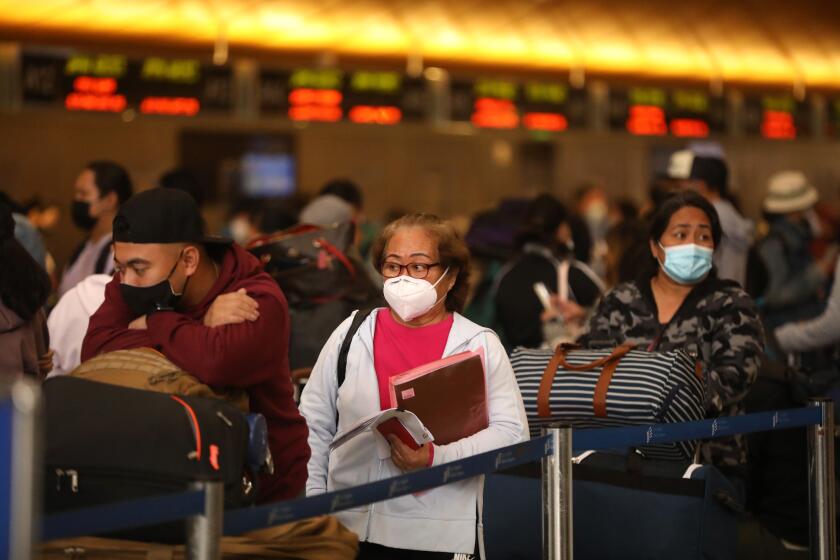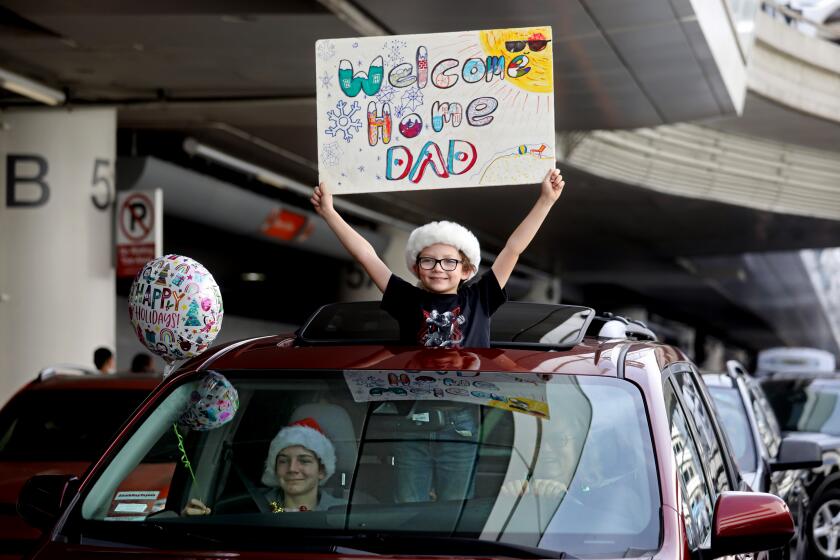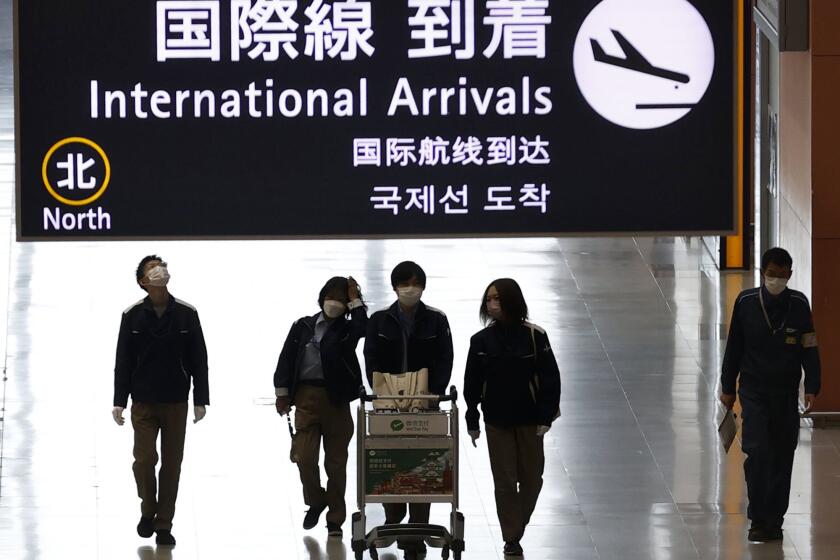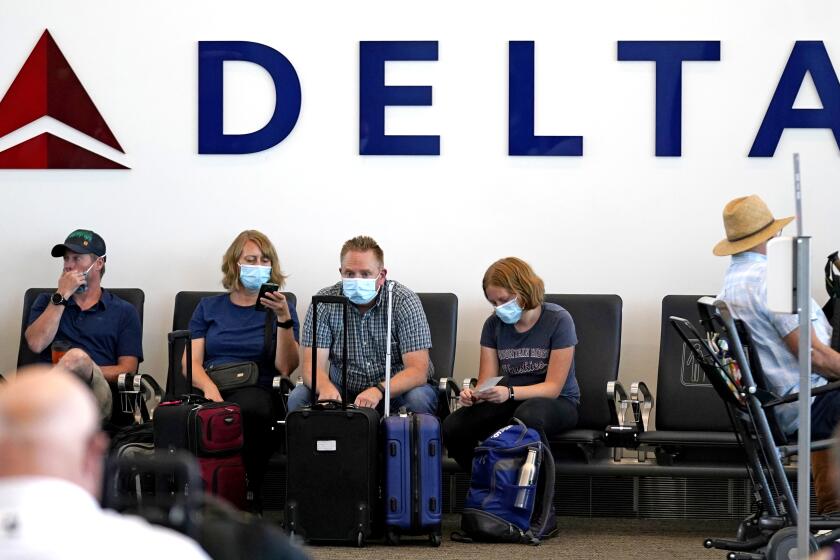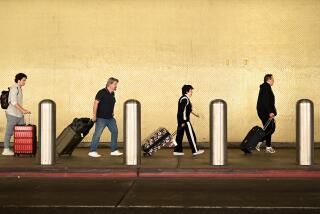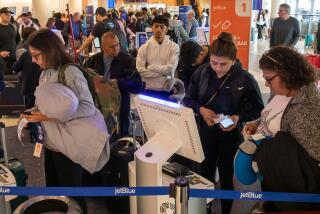Flying is already miserable this year. Is Omicron going to make things worse?

- Share via
After visiting friends and family in Orange County, Jamie Dietz and her husband, Craig, shuffled through crowds at Los Angeles International Airport this week to fly back home to Indianapolis. Like many others, they had weighed the risks of travel as a new variant of the coronavirus circulated with the need for time with their loved ones.
“The way we see it … COVID’s not going away, obviously, it’s just getting worse,” Jamie Dietz said before boarding her plane. “But traveling is one of our favorite things to do together so we’re not going to stop traveling as long as we can.”
As many as 3.5 million people are projected to travel through LAX from Dec. 16 to Jan. 3, according to airport officials, making it the busiest travel period this year. By many accounts, airlines and airports have not absorbed the rebound very well, with staffing shortages, shifting safety protocols and rowdy passengers bogging down travel.
Now, with the Omicron variant spreading quickly and many travelers determined to forge ahead with holiday plans, months of preparation by airlines and airport staff will face a test at large airports such as LAX.
If you’re traveling by plane this holiday season, here are tips for reducing your COVID-19 risk as much as possible at the airport and on your flights.
Industry executives say they have beefed up staffing enough to keep flights on schedule even as travel demand is expected to reach near pre-pandemic levels over the next few weeks. But it’s not yet clear how a rapid-fire spread of Omicron among airline staffers, for example, may disrupt flights in a system that is already strained.
“There is only so much airlines can do to prepare for that,” said Henry Harteveldt, a travel industry analyst with Atmosphere Research Group. “If a lot of employees come down with COVID, that could be very disruptive for the airlines.”

A handful of cancellations can have a ripple effect throughout the closely timed airline schedule, prompting cancellations and delays in connecting flights across the country.
Staffing shortages up and down the supply chain already have been contributing to delays, compounding bad weather, computer system outages and air traffic control glitches that in recent months caused major airlines to cancel thousands of flights.
As travel demand ramped up this summer, low-cost carrier Spirit Airlines canceled nearly 3,000 flights. Over the Columbus Day weekend in October, Southwest Airlines scuttled more than 2,000 flights. And on the final days of October, American Airlines canceled more than 1,700 flights.
American Airlines Chief Executive Doug Parker told a Senate committee last week that the Fort Worth-based carrier has hired more than 16,000 employees this year and is prepared for the holiday travel crush.
“We are ready and eager to fly our customers where they need and want to go as they celebrate this holiday season,” he said.
Up to 3.5 million people are expected to travel through LAX from Dec. 16-Jan. 3, airport officials said, making it the busiest travel period this year.
The Auto Club of Southern California predicted that 8.8 million Southern Californians will travel for the holiday period between Dec. 23 and Jan. 2, down only about 6% compared with 2019. Of those who are traveling for the holidays, about 771,000 are booking flights — roughly the same number as in 2019, the Auto Club said.
Since last Thursday, Transportation Security Administration officers have screened more than 2 million travelers across the U.S. per day, more than twice the passengers screened at the same time in 2020, and about 16% fewer than in 2019, according to the TSA.
The travel surge comes less than two years after the initial outbreak of COVID-19 pushed air travel demand to record low levels, forcing the nation’s airlines to park hundreds of idled airplanes in remote desert airports and furlough, retire or lay off more than 31,000 full-time workers.
Airlines have been rehiring workers steadily over the last few months but are not back to pre-pandemic levels. In October, they employed 9% fewer full-time staffers than in the same month in 2019, according to the most recent data by the U.S. Department of Transportation.
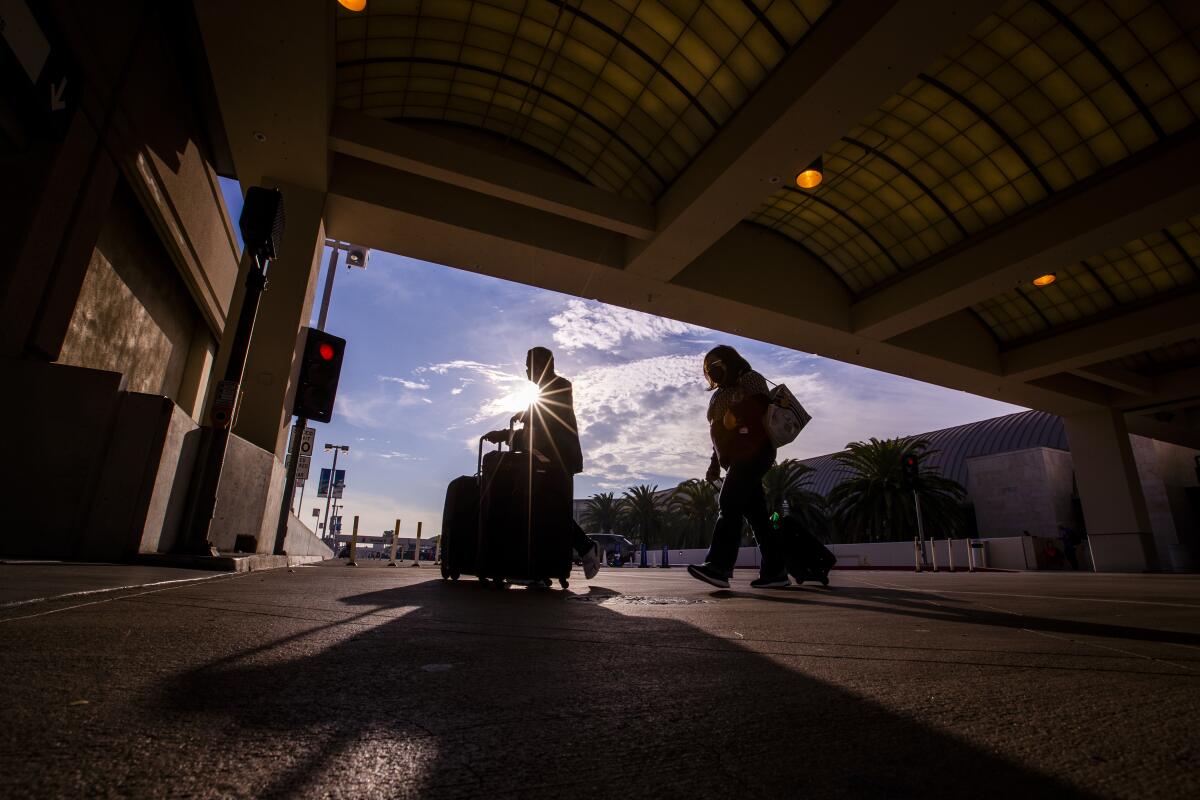
“We’ve said numerous times, the pandemic is unprecedented and extremely complex — it was messy going into it, and it’s messy as we fight to emerge from it,” Southwest Airlines President and Chief Operating Officer Mike Van de Ven said in a statement in October. He said the company’s “number one focus” was on hiring, with a goal of putting back to work more than 5,000 by the end of the year.
United Airlines has also been hiring, but the air carrier’s chief executive, Scott Kirby, said the holiday surge may still be a challenge.
“We feel good but there is a strain in the system, strain in the fuel vendors, catering, security screeners and across the board as we go through the holiday season,” Kirby said in a recent ABC news interview.
As more countries detect cases of the Omicron variant, conferences and business gatherings are being canceled. U.S. travel hasn’t yet been curtailed.
The nation’s largest carriers say most of their employees are vaccinated. Medical experts say the Omicron variant is expected to result in more breakthrough infections among vaccinated people compared with earlier coronavirus variants, raising the potential in coming weeks for more employers to be without those workers who get infected and must quarantine.
Another potential disrupter during this holiday travel season: unruly passengers, including those who tend to drink excessively or who refuse to wear a mask throughout flights. If flight attendants are forced to pull these passengers from flights, the delay could have a cascading effect on other flights.
The number of unruly passengers has been on the decline in the last few weeks, airline officials say.
To help crack down on the problem, the TSA recently announced a partnership with the Federal Aviation Administration to share information about passengers who are fined for unruly behavior. Not only will unruly passengers face fines of as much as $37,000 per incident, but also the TSA can remove these passengers from using the TSA PreCheck screening lines, which are expedited queues for low-risk travelers.
Airlines don’t share the names of passengers who are banned for unruly behavior. Delta wants to change that, starting with its 1,600-name no-fly list.
“One unruly incident is one too many,” FAA Administrator Steve Dickson said in a statement.
At LAX on Monday, holiday travelers were already struggling with crowds and delayed flights.
Shonda Green’s flight from Los Angeles to Dallas to attend her daughter’s graduation from Texas A&M University was delayed by four hours.
The departure time changed five or six times, she said, and she did not get an explanation from Delta Air Lines.
She said she was concerned about the Omicron variant but wasn’t going to let it keep her from attending her daughter’s graduation, or her son’s wedding next year. Green, who wore an N95 mask, said she is fully vaccinated, including a booster shot.
“I’ve been pretty much prepared for everything,” she said.
More to Read
Inside the business of entertainment
The Wide Shot brings you news, analysis and insights on everything from streaming wars to production — and what it all means for the future.
You may occasionally receive promotional content from the Los Angeles Times.
